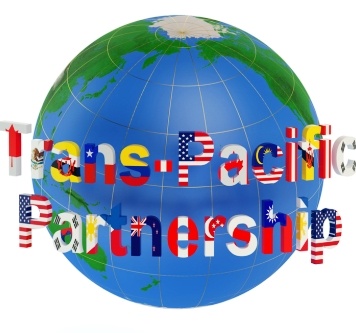 At BCR, we assist small, medium and large business customers in Sydney, Melbourne, Brisbane, Adelaide, Perth and all around Australia with 3PL services which include domestic and offshore warehousing, international freight forwarding services and expert Customs brokerage and consulting. In addition to providing 3PL services, at BCR we share information to assist businesses in Australia to stay informed. Today’s guest blog post from Russell Weise provides detail the Trans Pacific Partnership (TPP) and what it means for businesses in Australia.
At BCR, we assist small, medium and large business customers in Sydney, Melbourne, Brisbane, Adelaide, Perth and all around Australia with 3PL services which include domestic and offshore warehousing, international freight forwarding services and expert Customs brokerage and consulting. In addition to providing 3PL services, at BCR we share information to assist businesses in Australia to stay informed. Today’s guest blog post from Russell Weise provides detail the Trans Pacific Partnership (TPP) and what it means for businesses in Australia.
Read on to learn what the TPP is, how your Customs Broker can assist in determining which Free Trade Agreement (FTA) to use, how some Australian exporters can retain their current advantage and when the TPP may possibly commence.
Leaders from nations representing 40% of global GDP have finalised negotiations over the world's largest FTA. The Trans Pacific Partnership will bring trade facilitation benefits, but will also add another layer of complexity to the web of existing FTAs which traders and Customs Brokers must currently consider.
The Trans Pacific Partnership
The TPP members are an interesting mix of developed and developing countries being Australia, the USA, Japan, Canada, Mexico, Singapore, New Zealand, Chile, Peru, Malaysia, Brunei and Vietnam.
The TPP is billed as a 21st Century FTA covering much more than just reductions in tariffs on goods. To this end the TPP will comprehensively cover topics such as trade in services, liberalising foreign investment, providing greater access to Government procurement opportunities and setting minimum standards regarding competition policy, labour laws and environmental protection.
Of course, for Customs Brokers and those who trade in goods, a key consideration with any FTA is ‘what are the duty reductions’. For imports into Australia, the main direct benefit will be duty reductions on goods of Canadian, Mexican and Peruvian origin. While the imports of all TPP members will be largely reduced to zero, Australia already has FTAs with the remaining TPP countries.
Australian exporters will have increased access to Canada, Mexico and Peru. On top of this the TPP will deliver better outcomes for agricultural products in counties such as Japan and the USA than Australian obtained under the bilateral FTAs with those countries.
Which FTA to use
Once implemented, for 5 TPP countries there will be the choice of 2 FTAs and for another 3 there will be the choice of 3 FTAs. A key role for Customs Brokers will be advising clients on which FTA to use. There will be three different factors to consider:
- For which FTAs does the relevant good qualify? Under the TPP, inputs from all TPP countries can be considered when assessing the origin of the goods. For instance, USA goods with significant Mexican content might not qualify under the USA FTA, but would under the TPP.
- If multiple FTAs apply, which provides the lowest duty rate.
- What are the documentary requirements? Some FTAs require certificates of origin issued by authorised bodies, while others require a declaration of origin from the supplier. The TPP is likely to be less onerous and allow the claiming of a preference without the holding of a specific document.
First mover advantage
Once implemented the TPP will level the playing field for all TPP countries. At the moment, Australian exporters have an advantage as Australia has comprehensive FTAs with both Japan and the USA. This gives Australian agricultural exporters to Japan an advantage over key competitors NZ, Canada and the USA and Australian exporters have a competitive advantage over other Asia Pacific exporters into the USA market. The goal of Australian companies currently exporting to, or targeting, these markets should be to now fully utilise existing FTAs and entrench themselves in these markets before their competitive advantage is lost. It goes without saying that there is an important role for Customs Brokers in helping Australian exporters make better use of existing FTAs.
When will it commence
The question every Customs Broker will have been asked since the TPP was announced is: when will it commence? Normally with an FTA we expect a period of between 6 and 12 months between the conclusion of negotiations and the commencement of the FTA. However, the TPP involves 12 countries and each of those 12 countries will need to domestically implement the TPP. A major stumbling block could be the USA. The TPP will find itself being debated in a USA election year and while it is was a key policy of Obama Government, many Democrats, including Hilary Clinton, are opposed to the TPP.
From an Australian perspective, the TPP will have to go through a number of parliamentary committee reviews and the enabling legislation will have to pass parliament. When in Government, the Labor Party previously stated that the TPP was its key regional trade priority, but has been more equivocal in recent times. Taking all these factors into account, a 2018 commencement date seems likely.
The best is yet to come
The TPP is a living agreement with the potential to accommodate the joining of new countries. Already South Korea, Indonesia and the Philippines have expressed interest in becoming TPP members. It is conceivable that the TPP will be the foundation of an Asia Pacific free trade zone. This has the potential to make redundant the current noodle bowl of competing FTAs and reduce the costs of international trade.


